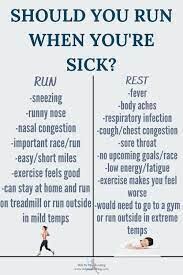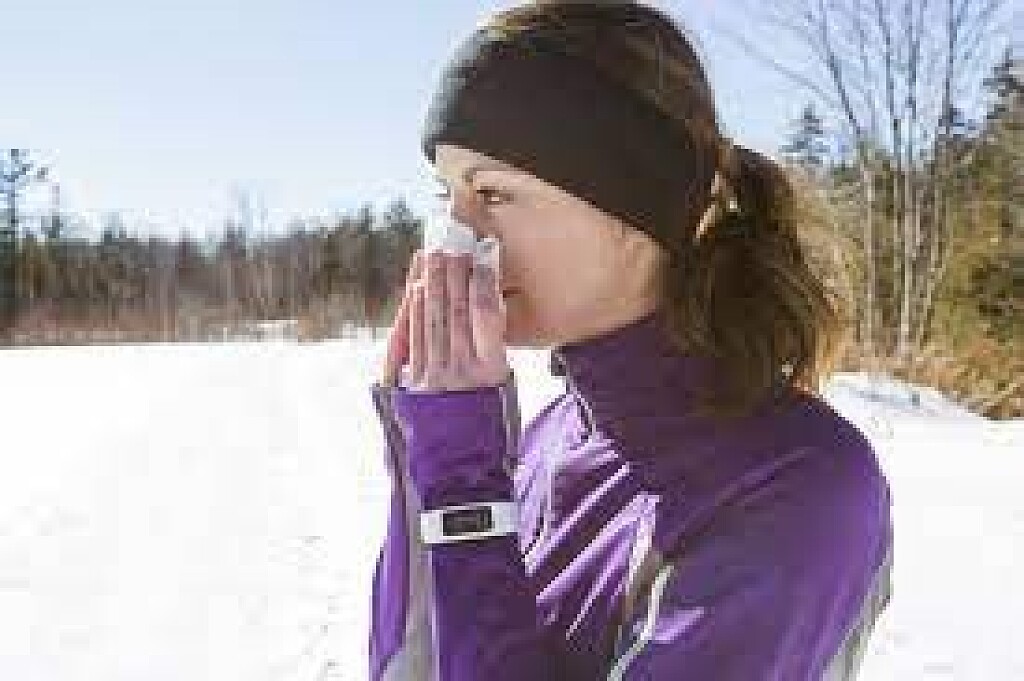Running News Daily
Running News Daily is edited by Bob Anderson. Send your news items to bob@mybestruns.com Advertising opportunities available. Train the Kenyan Way at KATA Kenya and Portugal owned and operated by Bob Anderson. Be sure to catch our movie A Long Run the movie KATA Running Camps and KATA Potato Farms - 31 now open in Kenya! https://kata.ke/
Index to Daily Posts · Sign Up For Updates · Run The World Feed
Should You Exercise While Under the Weather?
While a light jog or quick weights session might help clear out lingering congestion, there are times when exercise might actually do your body (and others) more harm than good
If you are consistently active, you probably feel strong, healthy and at times utterly invincible. This can make it doubly painful when your body does succumb to illness which, let’s face it, happens to the best of us. Not only do you feel icky when you’re sick, but you’re also discouraged from doing the one thing that makes you feel great: exercise.

There are a number of infections we can pick up throughout the year, some worse than others. While we’ve always been told to avoid working out while sick, it’s tempting to ask how sick is sick, and what counts as “working out”? Is a light walk OK, or should you avoid any activity altogether? Can you do weights at home? Here’s the real question: When (if ever) is it OK to exercise while you’re sick?
As it turns out, the question of whether you should work out while sick may depend on what you’re sick with and the severity of your symptoms. While a fever and upset stomach would stop most of us from even thinking about touching a weight, a stuffy nose and headache might actually benefit from a few minutes of movement. Here’s what you need to know to decide whether you should be working out while sick.
Under “normal” conditions, exercise is an acute stress that can temporarily suppress your immune system. As Kristina Kendall, Ph.D., lecturer at Edith Cowan University’s School of Medical and Health Sciences, explains, this really isn’t as bad as it sounds. “Your body’s immune system usually recovers within a couple of hours, assuming you are healthy and not already battling an infection,” she says. Over time, this pattern can actually build a stronger immune system.
However, when your immune system is already compromised (i.e., when you’re already sick), exercise will only make things worse. “Rarely would I recommend working out while sick, especially if it is a viral illness,” Kendall says. Viral infections can be spread through the air or on surfaces, while bacterial infections are spread through direct contact. Since working out while sick puts you in close proximity to others touching the same equipment, it’s best to stay out of the gym when you’re sick, both for your own health and for others.
“Working out while experiencing symptoms of a cold or flu not only can slow down the recovery process, but it also can put those around you at risk,” Kendall says.
How much rest you take also depends on the type of illness you have. If you’re experiencing a sinus infection or a head cold, for example, you can start working out once your primary symptoms (headache, sinus pressure, etc.) subside. You may feel good enough to go for a walk or a light bike ride after five to seven days, although in some cases, cold symptoms can last up to two weeks.
As long as you’re not battling below-the-neck symptoms like fever, tightness in the chest, sore throat or stomach ache, a light workout might even help clear up some of that lingering congestion. On this point, Kendall agrees. “Once the heavy symptoms are gone, getting some fresh air, sweating a bit, increasing blood flow and moving your body can actually feel pretty nice,” she says.
Infections that affect your respiratory system — chest cold, flu, pneumonia — are a whole different story. These types of illnesses can make breathing very difficult during exercise, so Kendall recommends waiting to work out until symptoms have passed completely. This is also another instance when your health can affect the health of those around you. If you have a respiratory infection and are coughing and contagious, stay away from public gyms. Nobody wants your germs.
Another thing to consider when weighing whether to work out is whether other factors might be off. As Kendall points out, in addition to making you feel crummy, illness can throw your sleep schedule, hydration and eating patterns off.
“Poor sleep, inadequate nutrition and dehydration only compound the negative effects of working out while sick,” she says. So not only will your performance during the workout suffer, but you’ll also probably do more harm than good and lengthen the time it takes your body to recover.
The take-away message? You really won’t see any improvements in performance and/or physique if you exercise while sick. Use this forced downtime to sleep, hydrate and recover. According to Kendall, if you allow your body to fully rest and recover, you’ll gain back any fitness losses more quickly than if you try to push through.
“Rest does a body good,” she says. “If you let your body fully heal, it’s also less likely you’ll catch another cold/virus in a couple of weeks.” So take a week off — big deal! You’ll gain back any fitness that you lost pretty quickly once you’re feeling better.
If you absolutely must exercise, you can get outside (not in a public gym where you can spread germs) and do some light exercise once your symptoms subside. When in doubt, check with your doctor for his or her recommendations and to learn how long you might be contagious for. This will definitely let you know when you can safely return to the gym.
by Outside Online
Login to leave a comment




